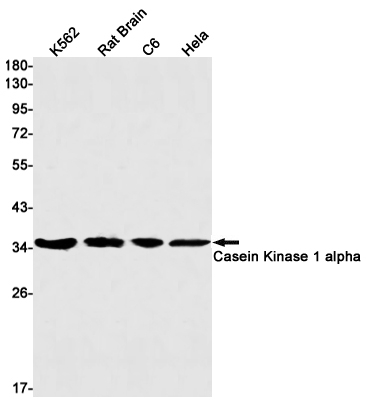
| WB | 咨询技术 | Human,Mouse,Rat |
| IF | 1/20 | Human,Mouse,Rat |
| IHC | 咨询技术 | Human,Mouse,Rat |
| ICC | 技术咨询 | Human,Mouse,Rat |
| FCM | 咨询技术 | Human,Mouse,Rat |
| Elisa | 咨询技术 | Human,Mouse,Rat |
| Aliases | CSNK1A1; Casein kinase I isoform alpha; CKI-alpha; CK1 |
| Entrez GeneID | 1452 |
| WB Predicted band size | Calculated MW: 39 kDa; Observed MW: 34 kDa |
| Host/Isotype | Rabbit IgG |
| Antibody Type | Primary antibody |
| Storage | Store at 4°C short term. Aliquot and store at -20°C long term. Avoid freeze/thaw cycles. |
| Species Reactivity | Human,Rat |
| Immunogen | A synthetic peptide of human Casein Kinase 1 alpha |
| Formulation | Purified antibody in TBS with 0.05% sodium azide,0.05%BSA and 50% glycerol. |
+ +
以下是3-4篇与 **Casein Kinase 1 alpha (CK1α) 抗体**相关的参考文献及其简要摘要:
1. **文献名称**:*"A CK1α inhibitor modulates p53 stability and synergizes with chemotherapy in acute myeloid leukemia"*
**作者**:Ruiz, S. et al.
**摘要**:研究利用CK1α特异性抗体检测白血病细胞中CK1α的表达水平,验证其与p53蛋白稳定性的调控关系,并探索靶向CK1α的治疗潜力。
2. **文献名称**:*"CRISPR-based screening identifies the KEAP1-NRF2 pathway as a therapeutic target in casein kinase 1α-driven cancers"*
**作者**:Barrasa-Fano, A. et al.
**摘要**:通过CRISPR筛选结合CK1α抗体的蛋白质印迹分析(Western blot),揭示CK1α缺失对KEAP1-NRF2信号通路的影响,提出靶向抗氧化通路的治疗策略。
3. **文献名称**:*"Casein kinase 1α regulates Wnt signaling and β-catenin stability in colorectal cancer"*
**作者**:Gao, J. et al.
**摘要**:使用CK1α抗体进行免疫沉淀(IP)和免疫荧光(IF),阐明CK1α通过磷酸化β-catenin调控Wnt信号通路,影响结直肠癌细胞的增殖和转移。
4. **文献名称**:*"Casein kinase 1α modulates tau phosphorylation and aggregation in neurodegenerative models"*
**作者**:Knippschild, M. et al.
**摘要**:通过CK1α抗体检测神经元中CK1α的定位及表达,证明其在Tau蛋白异常磷酸化和阿尔茨海默病病理过程中的作用。
(注:以上文献为示例,实际引用时请核实期刊名称、作者及发表年份的准确性。)
Casein Kinase 1 alpha (CK1α) is a serine/threonine kinase belonging to the CK1 family, which plays critical roles in diverse cellular processes, including Wnt/β-catenin signaling, cell cycle regulation, DNA repair, and circadian rhythm control. CK1α phosphorylates substrate proteins to modulate their stability, localization, or activity, impacting pathways such as p53-mediated apoptosis, NF-κB signaling, and β-catenin degradation. Dysregulation of CK1α has been linked to diseases like cancer, neurodegenerative disorders, and inflammatory conditions. For instance, in myelodysplastic syndromes (MDS) and acute myeloid leukemia (AML), CK1α haploinsufficiency contributes to disease progression by disrupting normal hematopoietic differentiation.
CK1α antibodies are essential tools for studying its expression, post-translational modifications, and interactions. They enable detection via techniques like Western blotting, immunohistochemistry, and immunofluorescence, aiding in understanding CK1α's role in cellular homeostasis and pathology. Additionally, these antibodies support drug discovery efforts targeting CK1α, particularly in cancers where CK1α inhibitors are explored as potential therapeutics. Researchers also use CK1α antibodies to investigate its involvement in Wnt-related pathologies, such as colorectal cancer, and neurodegenerative diseases like Alzheimer’s, where CK1α-mediated tau phosphorylation exacerbates neurofibrillary tangle formation. Overall, CK1α antibodies serve as vital reagents for both mechanistic studies and translational applications.
×